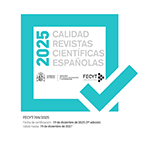Las Juntas de Reformas Sociales y el intervencionismo estatal en las relaciones laborales en Cataluña, 1900-1923
Abstract
Resumen: Las Juntas de Reformas Sociales nacen con la Ley de 13 de marzo de 1900 sobre condiciones de trabajo de mujeres y niños. Estaban integradas por seis patronos y seis obreros, dos vocales natos –el cura párroco y el médico-, y presididas por el alcalde. Entre sus atribuciones estaba la de inspección de los centros de trabajo; las condiciones de salubridad e higiene; formar estadísticas del trabajo; procurar el establecimiento de Jurados Mixtos de patronos y de obreros y entender en las reclamaciones que unos y otros les sometieren, velar por el cumplimiento de las leyes sociales. Se pretendía con ellas crear un instrumento favorecedor de consensos entre capital y trabajo, en aras de desactivar la conflictividad laboral y fueron imprescindibles en la aplicación de la incipiente legislación laboral, actuando como terminales del Instituto de Reformas Sociales a partir de su creación en 1903. En su seno, participaron de forma generalizada las organizaciones patronales y obreras más significativas de las localidades, enviando a sus principales representantes, dado el interés de ambas clases en no dejar los asuntos laborales en manos de actores de menor rango. Fueron organismos pioneros del arranque de un marco de relaciones laborales fallido donde, sobre un cúmulo de dificultades sufridas, sobresale la incapacidad, la ineptitud, la falta real de voluntad política de un Estado demasiado preso de sus propios miedos hacia un movimiento obrero emergente, considerado más como un peligro inminente, que amenazaba con imponer la revolución social, que como un actor social en busca del reconocimiento de derechos.
Boards of Social Reforms and state interventionism labor relations in Catalonia, 1900-1923.
Abstract: Boards of Social Reforms are born with the law of 13 March 1900 on working conditions of women and children. Consisted of six workers and six employers, two ex officio members, the parish priest and the doctor, and chaired by the Mayor. His powers were: “to inspect the centres of work; to take care of conditions of healthiness and hygiene; to form labour statistics; to help to create mixed Juries employer’s and worker’s; to understand in the claims submitted to it, and ensure compliance with the social laws”. They searched to become one of the main elements of consensus between capital and work, with the aim of disabling the work conflict. They had extensive powers and were essential in the implementation of the emerging working law, serving as a terminal of the Institute of Social Reforms. In its womb, in general, participated employers organizations and workers of the most important towns, which sent their main representatives, showings the interest of both classes of not leaving the work affairs in the hands of third parties row. The organisms were pioneers of the boot of a framework of relations that is not successful, that above all the difficulties which clashed with, stands the disability, the ineptitude, lack of real political of a state too prisoner of their own fears against an emerging working class movement, which looked more like as an imminent danger, which threatened to impose the social revolution, than as a social actor with their own inalienable rights.
Downloads
Article download
License
In order to support the global exchange of knowledge, the journal Sociología del Trabajo is allowing unrestricted access to its content as from its publication in this electronic edition, and as such it is an open-access journal. The originals published in this journal are the property of the Complutense University of Madrid and any reproduction thereof in full or in part must cite the source. All content is distributed under a Creative Commons Attribution 4.0 use and distribution licence (CC BY 4.0). This circumstance must be expressly stated in these terms where necessary. You can view the summary and the complete legal text of the licence.









